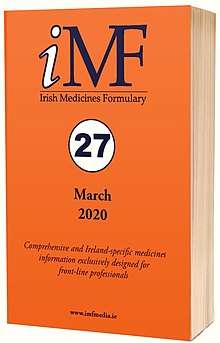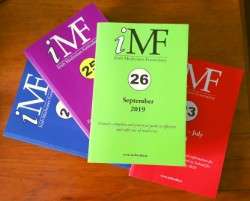Irish Medicines Formulary
 IMF (Irish Medicines Formulary) 27, March 2020 | |
| Language | English |
|---|---|
| Subject | Medicines |
| Genre | Medical/Prescribing Reference |
| Publisher | Meridian Ireland |
Publication date | Twice yearly (March, September) |
| ISBN | 978-1-9997470-5-3 |
Irish Medicines Formulary (IMF) 27 Published
Irish Medicines Formulary [1] ensures doctors, dentists, pharmacists and nurses have accurate medicines information which is medico-legally appropriate and up-to-date for Ireland.[2] The A-Z of medicines, it includes all original brands, branded generics and pure generics. Inclusion of nutritional supplements, herbal preparations, reimbursed medical devices and OTC products makes multidisciplinary team care a reality. IMF 27 also includes commonly prescribed Exempt Medicines[3] i.e. medicines that are prescribed in Ireland but are not licensed in Ireland.
Together with essential prescribing information, IMF also includes Irish-specific practical information – pricing in Euro, reference pricing, reimbursement status, generic substitution, storage requirements and effects of medicines on ability to drive. For any doctor, pharmacist, nurse or dentist intending to practice in Ireland, having the latest IMF book is like having a valid visa for entry and a driver's license for progress.
Published by Meridian Ireland,[4] IMF in paperback format is edited, designed and printed in Ireland. IMF-Online is also available. For more information visit www.imfmedia.ie.[5]
The Irish-specific prescribing information provided for each drug is sourced solely from the product license or Summary of Product Characteristics (SPC) specific for Ireland as published on the website of the Health Regulatory Authority (HPRA)[6] or the European Medicines Agency (EMA).[7]
First published in February 2007, IMF 27 has just been published (March 2020) and IMF-Online updated with the latest content. IMF-Online reflects the contents of the hard copy, except, in specialised areas such as Oncology, Immunology, HIV antivirals, where more detailed information is included.
NEW IN IMF 27, March 2020
NEW: National Immunisation Schedule for Ireland[8]
IMF 27 includes the recently revised National Immunisation Schedule for Ireland. This schedule includes vaccinations required for babies (2-13 months), children and adolescents (up to 13 years; boys and girls), 'at risk' groups (flu, pneumococcas) and pregnant women.
NEW: Antimicrobial Prescribing Guidelines for Primary Care in Ireland[9]
IMF 27 includes Antimicrobial prescribing Guidelines for EIGHT antibiotics with co-amoxiclav the most recent addition. Evidence-based antimicrobial guidelines are a key tool in efforts to improve antibiotic prescribing, reduce the progression of antibiotic resistance and optimise patient outcomes. The Community Antimicrobial Stewardship subcommittee of the SARI National Committee developed these guidelines from 2009-2011. Since 2011, they have been overseen by the RCSI[10]/HSE[11] Clinical Advisory Group on Healthcare-Associated Infection and Antimicrobial Resistance (HCAI/AMR), chaired by Dr Nuala O’Connor, ICGP[12] Lead.
IN ADDITION
- HSE-Medicines Management Programme Recommendations (HSE-MMP): IMF also includes the recommendations of the HSE Medicines Management Programme (MMP). The HSE-MMP aims to promote safe, effective and cost-effective prescribing in Ireland. It is a multidisciplinary unit led by Prof Michael Barry, Clinical Lead, and aims to provide sustained national leadership relating to issues such as the quality of the medicines management process, access to medicines and overall expenditure on medicines. The Preferred Drug initiative is an ongoing project supporting health professionals in choosing the most efficient drug option in various therapeutic areas as well as Best Value Biologicals (BVB). Preferred Oral Nutritional Supplements (ONS) for Adults Living in the Community are also included.[13]
- Oral Nutritional Supplements: Comprehensive information for oral nutritional supplements (ONS), tube feeds and disease-specific sip and tube feeds available in Ireland which is of particular importance to nursing professionals, dietitians and doctors especially in the Nursing Home, Elderly Care and Disability Care environment. The HSE-MMP Preferred ONS are also highlighted.
- Commonly Used Herbals and their Possible Effects on Prescribed Medicines: With many patients turning to self-medication, this offers additional safety information for the prescriber. Revised, updated and expanded it includes more supporting information in IMF-Online.
- Storage conditions: Specified by brand, information is now included for products that require refrigeration. Storage information is also included where products should specifically NOT be refrigerated or frozen. With certain injectable formulations e.g. insulin, the time that the product may be out of refrigeration is also included.
IMF Features
Prescribing Information: IMF provides prescribing information for medicines available to be prescribed for patients in Ireland. This affords prescribers an easy and quick double check e.g. dose (especially if different for Elderly or Adolescents/Children), suitable for use in certain special populations (a patient with renal or hepatic impairment or in pregnancy). Drug interactions (i.e. co-administered drugs if contraindicated or precautions are needed), special precautions (i.e. considerations before or while using the drug), as well as expected adverse events are also included.
Euro Price and Reimbursement: In addition to actual prescribing information, the doctor, nurse prescriber or pharmacist may also need to check administrative information which is specific for Ireland e.g. the Euro price or whether the medicine is reimbursed under the various Irish reimbursement schemes e.g. GMS Scheme (GMS) or High Tech Scheme (HT).[14] Reimbursement falls under the remit of the Health Service Executive (HSE).[11]
Drugs in Sport and Driving: Also included is top-line information on the use of drugs in Sport as sourced from the World Anti-Doping Agency[15] and information on driving as sourced from the Summary of Product Characteristics for each drug and supplemented with information from the DRUID (Driving Under the Influence of Drugs, Alcohol and Medicines) Project.[16] The ATC Code for each molecule is also included for accurate referencing of medicines prescribed when legally required.[17]
HPRA Pharmacovigilance Information: Each edition also includes pharmacovigilance information supplied by the Health Products Regulatory Authority (HPRA).[18]

- IMF 27: Methotrexate - New Measures To Prevent Dosing Errors
- IMF 26: Domperidone-Containing Medicines: No Longer Approved For Use in Children Due To Lack of Efficacy
- IMF 25: FLUOROQUINOLONE ANTIBIOTICS – EU Review advises restrictions for certain infections and warns of rare but serious long lasting adverse reactions.[19]
- IMF 24: Valproate (Epilim): New contraindications, strengthened warnings and measures to prevent exposure during pregnancy
- IMF 23: New CPD E-LEARNING MODULE on reporting suspected Adverse Drug Reactions.
- IMF 22: Domperidone-Containing Medicines: Reminder of the Risk of Cardiac Adverse Reactions – Restricted Indication, Contraindications and Reduced Dose and Duration of Use.
Adverse Reaction, Quality Defect Report Forms: Copies of the official Health Products Regulatory Authority Adverse Reaction Report Form (yellow card) and Quality Defect Report Card (green card).[20] can be found in IMF.
How to write a prescription in Ireland: IMF-Online includes information on Prescription Writing from the Royal College of Surgeons in Ireland (RCSI) i.e. rules and regulations pertaining to prescription writing according to Irish legislation,[21] as well as the legal requirements for writing prescriptions for Controlled Drugs.[22] The information pertaining to prescriptions for Controlled Drugs has been updated in accordance with the newly published 2016 legislation. [23]
IMF Users
IMF is used by Irish General Practitioners (GPs), Hospital Doctors, Nurse Prescribers and Pharmacists in both community and hospital practice. Particularly useful is that under each molecule (INN), IMF lists the generic brands marketed in Ireland. With increasing use of generics through substitution, doctors and pharmacists can use IMF to show patients that the generic equivalent they have received is the same as the original brand. The website of the HPRA lists the interchangeable medicines that are licensed[24] in Ireland but not all of them are necessarily marketed; however, IMF includes those that are both licensed and marketed i.e. available to prescribe.
IMF is also used by nursing professionals (especially nurse prescribers and public health nurses), academic institutions e.g. the Department of Family Medicine and General Practice, Royal College of Surgeons in Ireland (RCSI)[25], state health and regulatory agencies e.g. Primary Care Reimbursement Service (PCRS)[14], the HSE[11], HPRA[26] and professionals working in the pharmaceutical industry. IMF is also widely used to ensure effective medication management in Nursing Homes throughout Ireland.
The Medical Protection Society (Ireland)[27] produces a number of guidelines addressing safety issues, including safe prescribing. Their guidelines "Avoiding Problems – Managing the Risks in Hospital Practice"[28] and "Avoiding Problems – Managing the Risks in General Practice in Ireland"[29] advise "adopting accepted practice", for example, "prescribing in accordance with the Irish Medicines Formulary".
IMF is a fully complete and independent medicines reference specific of Ireland and is published each March and September
References
- Glossary, Health Products Regulatory Authority (HPRA)
- Irish Medicines Formulary.
- Exempt Medicines, Health Products Regulatory Authority (HPRA)
- Meridian Ireland
- Irish Medicines Formulary.
- Health Products Regulatory Authority (HPRA)
- European Medicines Agency
- National Immunisation Office Website
- Antimicrobial Prescribing Guidelines for Primary Care in Ireland
- /Royal College of Physicians in Ireland
- Health Services Executive (HSE), Ireland
- /Irish College of General Practitioners
- HSE-Medicines Management Programme
- PCRS Information, Health Services Executive (HSE) Website
- World Anti-Doping Agency Website
- "DRUID Project Website". Archived from the original on 7 August 2013. Retrieved 7 August 2013.
- WHO Collaborating Centre for Drug Statistics Methodology Website
- Drug Safety Information for Healthcare Professionals, HPRA Website
- HPRA IMF Article March 2019
- Publications And Forms, HPRA Website
- S.I.No.540/2003– Medicinal Products (Prescription and Control of Supply) Regulations 2003
- S.I. No. 328/1988 — Misuse of Drugs Regulations, 1988
- Misuse of Drugs Regulations, 2016
- Interchangeable Medicines, HPRA Website
- Department of Family Medicine and General Practice, RCSI
- Health Products Regulatory Authority (HPRA) Website
- Medical Protection Society Website.
- 'Avoiding Problems – Managing the Risks in Hospital Practice, Medical Protection Society Website
- Avoiding Problems – Managing the Risks in General Practice in Ireland, Medical Protection Society Website